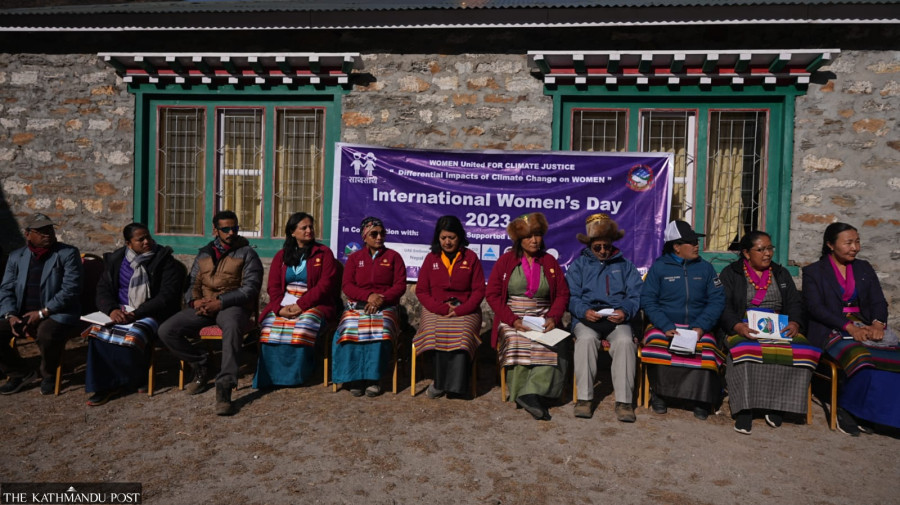Climate & Environment
Khumjung women voice climate concerns
At an interaction held on International Women’s Day, residents of the Solukhumbu village shared their grievances on the impact of climate change on their daily lives including reduced harvests owing to less rainfall and low soil fertility.
Bhanubhakta Niraula
Pemba Yangji Sherpa of Khumjung in Khumbu Pasang Lhamu Rural Municipality-4, Solukhumbu laments that the local residents of this high-altitude settlement are hardest hit by climate change.
“It has stopped snowing in the mountains and water springs have dried up,” Pemba Yangji says. “Harvest has slumped for the past five years and soil fertility has reduced markedly.”
At a function organised to mark the International Women’s Day on Wednesday, Pemba Yangji and other local women shared their ordeals to a visiting team that comprised Deputy Speaker Indira Rana Magar, former Foreign Minister Bimala Rai Paudyal and other experts.
“Tourists do not visit the place as there is no snowfall and this directly hits our hospitality businesses,” said Pasang Sherpa, president of the Khumbu Women’s Committee. “Neither rainfall or snowfall is timely.”
The interaction, organised to discuss the impacts of climate change on the lives of women and local people in the high-altitude regions, took place in the mountainous village of Khumjung. Like many other mountainous settlements across the country, this village, located on the lap of Mt Everest, has been bearing the brunt of climate change.
Hundreds of women of the region submitted their written concerns to the visiting team of experts on problems faced by women due to climate change. The event was jointly organised by Khumbu Women’s Committee and Sath Sathai, an NGO working towards ensuring women’s participation in climate advocacy and action. The event was supported by the United Arab Emirates Embassy in Nepal and various Nepali ministries.
Addressing attendees, Deputy Speaker Rana Magar said that the state will manage climate adaptation programmes at the policy level.

“I trekked from Lukla to Khumjung and I saw that the environmental balance had been lost,” she said. “The state needs to be serious about the issue as tourism and climate should move forward together.”
Former minister Paudyal said the problem faced by the women of Khumbu region is a representative problem of the whole country.
“You have been facing environmental issues in the Himalayas for years. Your experience and learning can be the basis of policy-making for the state,” she said. “I will strongly voice the issue of protecting the environment at the policy-making level so that a situation will not arise for women of the region for not being able to work in agriculture and tourism.”
Meanwhile, climate change expert Madhav Karki said Nepal’s climate change policy has guaranteed the rights of women, adding that women now need to seek their rights from all the three tiers of government.
“The women in the Himalayan region have been hit hard, from household chores to agricultural activities,” Karki said. “There is a serious issue of water supply in the region.”
A team of campaigners had reached Khumjung to study the impact of climate change on the lives of women and local people in the high mountain region.
The aim of the initiative, organisers said, was to draw global attention to the challenges of climate change in the mountain region and seek support, as well as shed light on the challenges faced by the people living in the Himalayas, especially women.




 9.88°C Kathmandu
9.88°C Kathmandu











